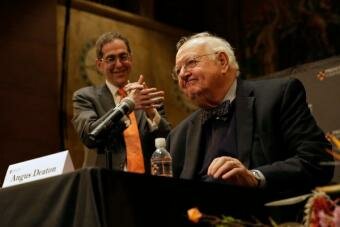A team of mathematical experts have said that 1729, which is also known as the Ramanujan-Hardy number, is linked to aspects of string theory and...

On Monday, Angus Deaton from the Princeton University won the Nobel Prize in economics for his extraordinary work that helped redefine the way poverty is actually being measured across the world, particularly in India.
The Scottish economist won the Nobel Prize for 'his analysis of consumption, poverty, and welfare', the Royal Swedish Academy of Sciences said on Monday.
Deaton, who was born in Edinburg in 1945 presently works with the Princeton University in the United States. According to the academy the work for which Deaton received award revolves around three central questions: how do consumers distribute their central spending among different goods; how much of society's income is spent and how much is saved; and how do we best measure and analyze welfare and poverty?
During a press conference Deaton called himself a person who is highly concerned about the poor of the world and how people behave, and what all can give them good life.
The award committee said that work presented by Deaton is of major importance for human welfare. The secretary of the award committee, Torsten Persson, said Deaton's research has really shown other researchers and international organizations like the World Bank how to go about understanding poverty at a very basic level.
"We cannot understand the whole without understanding what is happening in the miniature economy of our daily choices", said Persson.
Deaton who holds US and British dual citizenship said he was pleased to have the award and was happy that the committee decided to award work that concerns the poor people of the world.
In 1992, Mr. Deaton argued that further progress on difficult economic questions would be likely "when macroeconomic questions are addressed in a way that uses the increasingly plentiful and informative microeconomic data."









